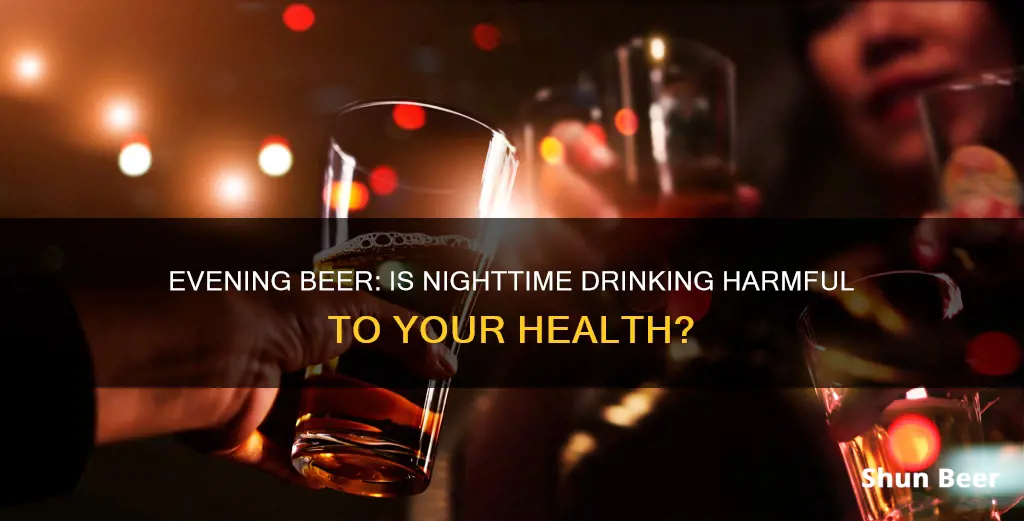
Beer is a popular alcoholic beverage, especially in the United States, where it accounts for over 55% of all alcohol consumed. While some studies suggest that moderate beer drinking may offer certain health benefits, others indicate that any amount of alcohol can be detrimental to health. The effects of drinking beer at night are varied and depend on various factors, including the amount consumed, frequency, and individual health conditions. This topic explores the impact of nightly beer consumption on weight, kidney function, heart health, sleep quality, and potential health risks such as cancer and liver disease.
| Characteristics | Values |
|---|---|
| Weight gain | Beer is high in calories and carbohydrates, which can lead to weight gain. |
| Oral health | Beer can stain and discolour teeth, and heavy drinking increases the risk of oral cancer. |
| Sleep | Alcohol can disrupt sleep, causing insomnia and snoring. |
| Kidney health | Excessive drinking can cause hypertension and increase the risk of kidney disease. |
| Heart health | Heavy drinking damages the heart, but moderate drinking may be beneficial. |
| Brain health | There is conflicting evidence on the impact of beer on brain health. |
| Liver disease | Regular beer drinking increases the risk of liver disease. |
| Cancer | Drinking beer, even in moderate amounts, has been linked to an increased risk of certain cancers. |
| Bone health | Beer contains silicon, which contributes to better bone health. |
| Vitamin B levels | Beer is relatively rich in B vitamins compared to other alcoholic drinks. |
What You'll Learn

Weight gain
Drinking beer at night can have an impact on weight gain, but the research on this topic is mixed. While beer contains calories that can contribute to weight gain, the link between moderate alcohol consumption and weight gain is uncertain. However, heavy drinking or binge drinking can increase the risk of weight gain over time.
Beer contains calories, with an average 12-ounce serving containing around 153 calories. These calories are often referred to as "empty calories" because they provide little to no nutritional value. Over time, consuming excess empty calories can lead to weight gain. Additionally, alcohol can affect hormones that control appetite, hunger, and stress, leading to increased food consumption and potential weight gain.
According to the National Institute on Alcohol Abuse and Alcoholism (NIAAA), heavy drinking is defined as more than three drinks per day or seven drinks per week for females, and more than four drinks per day or 14 drinks per week for males. Binge drinking, which is defined as consuming five or more drinks within a short period, can also lead to weight gain. Even occasional binge drinking can contribute to weight gain in the long run.
The impact of alcohol on weight gain is complex. While alcohol may not directly cause weight gain, it can affect the body's ability to process and burn fat. When you consume alcohol, your liver prioritizes breaking down alcohol instead of fat, leading to a buildup of fat in the body. This can result in a "beer belly," which is a common term for abdominal weight gain associated with alcohol consumption.
To minimize the risk of weight gain, it is important to drink in moderation and choose lower-calorie alcoholic beverages. Eating before drinking and staying hydrated can also help. Additionally, avoiding high-calorie mixers and paying attention to serving sizes can help reduce the impact of alcohol on weight gain.
Beer Overload: Yeast Infection Culprit?
You may want to see also

Oral health
Drinking beer, especially in the evening, can have a negative impact on oral health. Firstly, beer is a sugary drink, and the bacteria in the mouth feed on this sugar, resulting in plaque formation. This sticky substance can then harden into tartar, which can lead to gum disease and infections. The sugar in beer also contributes to tooth decay, as the bacteria in the mouth feed on it, causing gums to become irritated, leading to bad breath, swelling, and bleeding.
Secondly, beer is an acidic drink, and its acidity can erode tooth enamel, exposing the dentin underneath, which can cause sensitivity and further discolouration. The darker the beer, the more likely it is to stain teeth, and the more acidic it tends to be. Beer is also a diuretic, which can lead to dehydration and dry mouth, hindering the body's ability to produce enough saliva to wash away food particles and bacteria, and to keep the mouth clean.
However, there are some positive effects of beer on oral health. Hops and barley, two key ingredients in beer, are high in silicon and calcium, which promote strong bones and teeth. The fermentation process and the presence of hops also mean that beer contains good bacteria, which can help balance the oral microbiome and prevent the development of harmful microorganisms in the mouth, including those that cause gum disease and cavities.
To minimise the negative effects of beer on oral health, it is important to drink in moderation, to stay hydrated by drinking water alongside beer, and to maintain good oral hygiene practices, including regular brushing and flossing.
Alligators and Beer: A Drinking Buddy?
You may want to see also

Sleep disruption
Drinking beer at night, especially right before bed, can have a detrimental impact on your sleep. While alcohol can make you feel sleepy at first, it can also disturb your sleep as it wears off.
Firstly, alcohol enhances the brain's levels of adenosine, a chemical that can induce sleepiness. However, as the effect of alcohol wears off, it can lead to frequent, short awakenings throughout the night. This is because it takes approximately one hour for the body to process one serving of alcohol, and if you have multiple drinks, the effect may be more pronounced. As a result, you may experience fragmented sleep and insomnia.
Secondly, alcohol can suppress your REM sleep cycles. REM sleep is crucial for dreaming, learning, and memory processing. Drinking beer nightly can disrupt these cycles, leading to lower-quality sleep. You may wake up feeling groggy and unrested, impacting your overall productivity and mood during the day.
Additionally, alcohol consumption can relax the airway, leading to more intense snoring and potentially worsening conditions like obstructive sleep apnea. It can also alter your melatonin levels, a hormone that helps regulate sleep. These disruptions can further contribute to sleep disturbances and insomnia.
To minimise the impact of alcohol on your sleep, it is recommended to refrain from consuming alcohol within four hours of bedtime. If you continue to experience sleep difficulties even after reducing your alcohol intake, it may be advisable to consult a sleep specialist.
Cemetery Drinking: Is Beer Allowed on Sacred Grounds?
You may want to see also

Eye health
Drinking beer or other alcoholic beverages can have several effects on eye health, both short-term and long-term.
Short-term effects
- Blurred or double vision is a common side effect of drinking alcohol. This is due to the disruption of blood sugar levels and the inflammatory nature of alcohol, which can cause the eye lens to swell.
- Red or bloodshot eyes can occur due to the dilation of blood vessels in the eyes, causing more blood to flow through them.
- Dry eyes are another common issue associated with alcohol consumption. Alcohol is a diuretic, which increases urination and contributes to dehydration. This can lead to insufficient tears to keep the eyes lubricated.
- Twitching and trouble focusing can occur due to reduced pupil reaction times, affecting their ability to respond to different lights and colours.
- Eye movements can be affected, with the presence of nystagmus (involuntary rhythmic eye movements) being one of the sobriety tests used by police to determine if a driver is intoxicated.
Long-term effects
- Loss of vision or toxic amblyopia can occur due to damage to the optic nerve caused by excessive alcohol consumption.
- Distorted vision can result from reduced effectiveness of communication between neurotransmitters in the brain, leading to weakened eye muscle coordination.
- Cataracts are associated with higher alcohol consumption. A study found that people who drank every day were around 11% more likely to need cataract surgery later in life compared to non-drinkers.
- Age-related macular degeneration (AMD) is a deterioration of the central part of the retina. Excessive alcohol consumption is considered a risk factor for AMD.
- Vitamin A deficiency can occur due to excessive alcohol intake inhibiting the liver's ability to absorb vital vitamins. Vitamin A is essential for eye health, and its deficiency can lead to night blindness, thinning of the cornea, corneal perforation, dryness, and even blindness due to retinal damage.
- Optic neuritis refers to the inflammation of the optic nerve, causing blurry vision, loss of colour vision, headaches, and loss of central vision.
- Decreased contrast sensitivity can occur due to alcohol's impact on the eye's ability to adjust to brightness and contrast.
Tanning with Beer: Does It Work?
You may want to see also

Risk of diabetes
Excessive alcohol consumption is associated with an increased risk of type 2 diabetes. However, the relationship between alcohol and type 2 diabetes risk is complex, and the safest way to drink alcohol is to stay within government guidelines. According to the 2020-2025 Dietary Guidelines for Americans, women should limit their alcohol intake to one drink per day, and men should limit their intake to two drinks per day. In the case of beer, one 12-ounce can is considered one drink.
Beer is a significant source of carbohydrates, and it can impact blood sugar levels. The liver, where glucose is stored and released into the bloodstream as needed, is also responsible for clearing alcohol from the system. Therefore, drinking alcohol can slow down carb metabolism and lead to low blood sugar (hypoglycemia). This effect is exacerbated when drinking alcohol with diabetes medications. As a result, it is essential to be mindful when consuming beer or other alcoholic beverages when one has diabetes.
To avoid hypoglycemia, it is recommended to not drink on an empty stomach and to check blood sugar levels often while drinking and up to 24 hours after stopping. Additionally, drinking with food and staying hydrated by drinking water with beer can help manage blood sugar levels.
Beer is typically higher in carbohydrates than other alcoholic drinks like wine or liquor, and the carb content can vary widely depending on the type of beer. "Light" beers have the fewest carbs, usually five grams or less per serving, and are also lower in alcohol content. On the other hand, hoppy craft beers like IPAs and stouts tend to be much higher in carbs, with 15 grams or more per serving, and are also higher in calories and alcohol content. Therefore, it is best to stick to just one serving of these higher-carb beers.
While moderate alcohol consumption (no more than one to two drinks per day) is generally considered safe for most people with diabetes, it is important to be aware of how alcohol can affect blood sugar levels and to take necessary precautions to avoid hypoglycemia.
Pumping and Drinking: Is It Safe to Mix?
You may want to see also
Frequently asked questions
Drinking beer at night is not recommended, as it can negatively impact your sleep quality. While alcohol may initially make you feel tired, it can cause frequent awakenings and interrupt REM sleep, which is important for dreaming, learning, and memory processing. It is advised to refrain from consuming alcohol within the last four hours before bedtime.
Beer contains approximately 150 calories per 12-ounce serving, and its alcohol content can impact the way your body metabolises fat. Regular consumption of beer, especially when paired with snacks, can contribute to weight gain.
Drinking beer at night can increase your risk of oral health issues, stomach problems, liver disease, and certain types of cancer. Additionally, it can disrupt your sleep, leading to insomnia and fatigue.
Some studies suggest that moderate consumption of beer may have potential benefits, such as a reduced risk of diabetes and improved heart health. Beer also contains B vitamins and antioxidants, which can provide nutritional benefits. However, it is important to note that excessive consumption can outweigh these potential benefits and lead to health issues.







